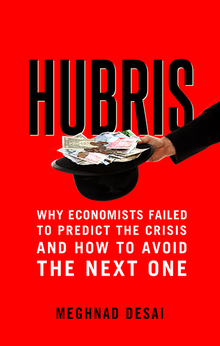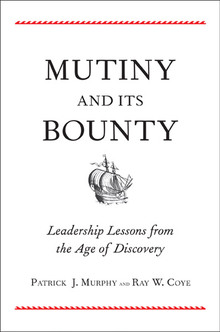Hubris
WARNING
You are viewing an older version of the Yalebooks website. Please visit out new website with more updated information and a better user experience: https://www.yalebooks.com
Why Economists Failed to Predict the Crisis and How to Avoid the Next One
Meghnad Desai
A frank assessment of economists’ blindness before the financial crash in 2007–2008 and what must be done to avert a sequel
The failure of economists to anticipate the global financial crisis and mitigate the impact of the ensuing recession has spurred a public outcry. Economists are under fire, but questions concerning exactly how to redeem the discipline remain unanswered. In this provocative book, renowned economist Meghnad Desai investigates the evolution of economics and maps its trajectory against the occurrence of major political events to provide a definitive answer.
Desai underscores the contribution of hubris to economists’ calamitous lack of foresight, and he makes a persuasive case for the profession to re-engage with the history of economic thought. He dismisses the notion that one over-arching paradigm can resolve all economic eventualities while urging that an array of already-available theories and approaches be considered anew for the insights they may provide toward preventing future economic catastrophes. With an accessible style and keen common sense, Desai offers a fresh perspective on some of the most important economic issues of our time.
The failure of economists to anticipate the global financial crisis and mitigate the impact of the ensuing recession has spurred a public outcry. Economists are under fire, but questions concerning exactly how to redeem the discipline remain unanswered. In this provocative book, renowned economist Meghnad Desai investigates the evolution of economics and maps its trajectory against the occurrence of major political events to provide a definitive answer.
Desai underscores the contribution of hubris to economists’ calamitous lack of foresight, and he makes a persuasive case for the profession to re-engage with the history of economic thought. He dismisses the notion that one over-arching paradigm can resolve all economic eventualities while urging that an array of already-available theories and approaches be considered anew for the insights they may provide toward preventing future economic catastrophes. With an accessible style and keen common sense, Desai offers a fresh perspective on some of the most important economic issues of our time.
Meghnad Desai is emeritus professor of economics, London School of Economics, where he was also founder and former director of the Global Governance Research Centre. He is a member of the House of Lords and chairman of the Advisory Board at the Official Monetary and Financial Institutions Forum. He lives in London.
“Deserves to be widely read.”—Diana Hunter, Financial World
'Here is something completely different: a really rather delightful and useful little survey of economic history... that deserves to be widely read.’—Diana Hunter, Financial World.
“A good primer”—Stephen Williams, African Business
ISBN: 9780300219494
Publication Date: June 14, 2016
Publication Date: June 14, 2016
304 pages, 5.5 x 8.5
8 b/w figs.
8 b/w figs.
Sales Restrictions: World excluding India, Pakistan, Nepal, Bhutan, Bangladesh, Sri Lanka and Maldives. Rights bought by HarperCollins Publishers India.








